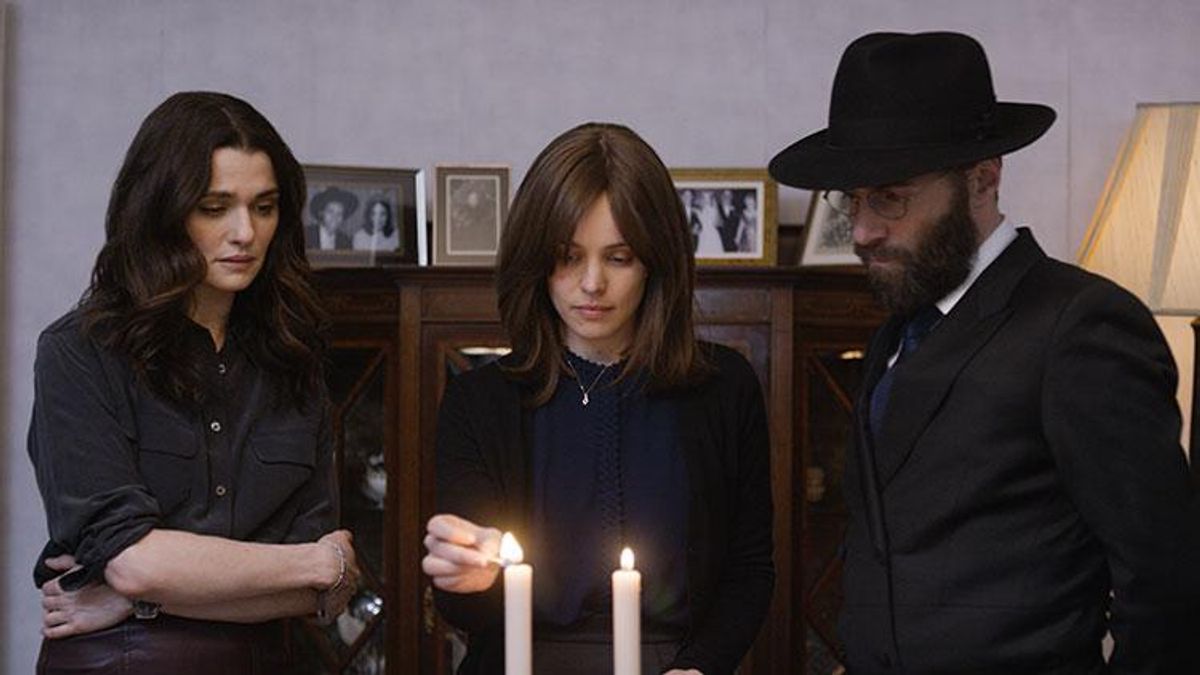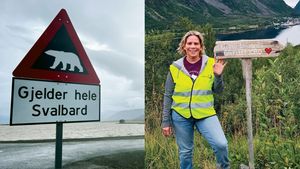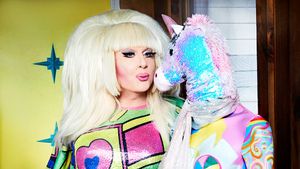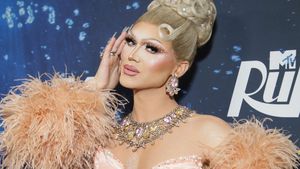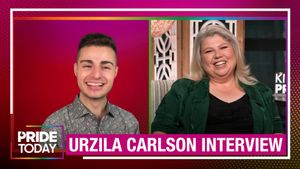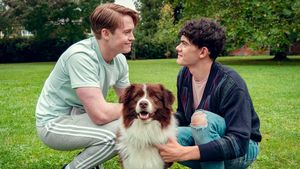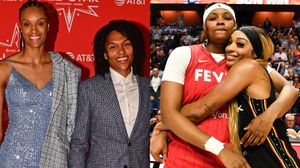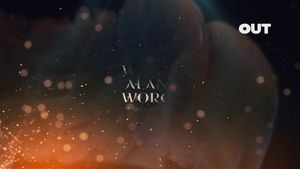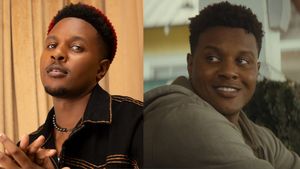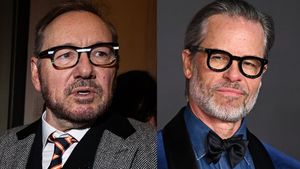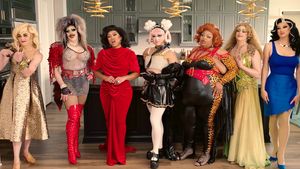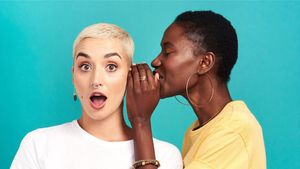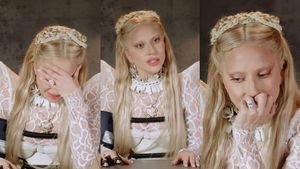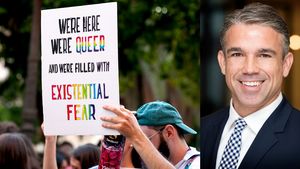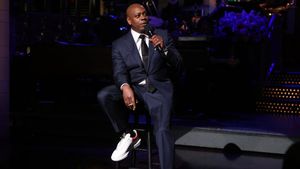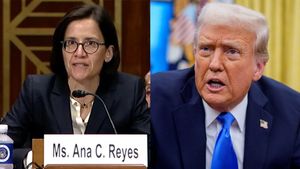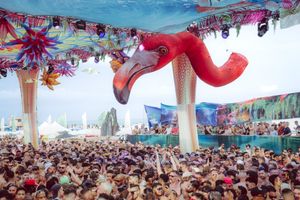From Call Me by Your Name to A Fantastic Woman to Love, Simon, the Trump era has produced some exceptional queer films. But the most anticipated LGBT movie of the year is yet to be released -- Disobedience, a drama directed by Sebastian Lelio (fresh off the Best Foreign Film Academy Award win of his movie A Fantastic Woman) and starring Rachel Weisz and Rachel McAdams as two Orthodox Jewish women dangerously in love.
When it's released later this month, the A-list talent and creatives behind Disobedience position it to be a game-changing film; but the game is complex for the Jewish community. Over the years, American and Israeli Jews have established themselves as one of the most accepting religious communities when it comes to the LGBT community, from launching enormous Pride parades to directing films like Carol (thanks, Todd Haynes) to welcoming growing numbers of ordained LGBT rabbis. But Disobedience goes under the hood of the most traditional Jewish community, set in the most vulnerable population of Jews, but also the most homophobic.
Asher Gellis, the founder and executive director of JQ International, an organization that breaks down walls between the LGBT and Jewish communities, recently sat down with the group's assistant director, Arya Marvazy, to discuss how to better reconcile the two identities and possibly use Disobedience as a launching point.
"Storytelling is really important, even when it's painful," Gellis explains when asked about Disobedience, "Films that speak about what it's like to be a lesbian Orthodox are vital, and we've seen that the stories that we've told have deeply affected our community and has helped changed hearts and minds in terms of supporting our community."
There are three major sects of Judaism: Reform, Conservative, and Orthodox. While Reform Jews tend to be secular, Conservative is more, well, conservative, and Orthodox Jews wear their religion on their sleeve -- or in this case, on their heads. They never leave the house without a skullcap or traditional garb, making them visible targets for anti-Semites. Jews experience more hate crimes than any other religious minority in America, and in 2017 there was the highest level of anti-Semitic incidents in two decades.
"There's definitely an increase of anti-Semitism and homophobia that we're experiencing across this country, and we, unfortunately, just about six weeks ago, lost a gay Jewish teen who was murdered, and while the details are not fully out, at least what has been reported, it was done by a white supremacist," Marvazy says of Blaze Bernstein, a gay and Jewish 19-year-old University of Pennsylvania student who was stabbed to death after leaning in to kiss a male classmate. "There are hate groups that are celebrating this atrocity. And they're being riled up by it. We're dealing with a lot of hatred and a lot of divisiveness, and for us, we're trying to encourage our community to build bridges and dialogue between different communities."
This is not the only death the Jewish community is mourning; Mireille Knoll, an 85-year-old Holocaust survivor, died after being stabbed 11 times and set on fire in Paris this month. Two murder suspects are in custody. According to the French interior minister, one suspect told the other, "She is a Jew, she must have money."
The state of anti-Semitism leaves the community Disobedience portrays uniquely vulnerable. But in Orthodox communities, homosexuality is at its most taboo; coming out could lead to your family mourning you as if you died. Will the movie depict the Jewish community in a way that will create more animus toward it?
Perhaps, but it could also lead to necessary conversations, explains Gellis. "We saw what happened in some Orthodox communities where they told their community members to avoid the gay Pride parades," he remembers, "That started conversations within the community, where people were asking questions, like what does it mean? And some people have never heard these words, and they have no frame of reference around it, so the more we talk, the more push that happens, the more we make progress."
But what does progress look like for the Orthodox Jewish community? "I've had conversations with Orthodox rabbis who, in a one on one meeting, are willing to say point-blank they fully understand and can even accept, I don't know if I would go as far as embrace, LGBTQ people as children of God and created equally; however, the blockage comes with this piece around the sins of actually behaving on homosexual desire," Marvazy says. "I think one of the beauties of Judaism is that above all else comes the commandment to recognize and elevate the humanity of every soul."
Accepting his queer soul was a complicated journey for Marvazy, who "grew up in a pretty staunchly conservative Persian community" in Los Angeles. "I thought that I would either stay closeted my entire life, or in my youth, I'd sort of throw this magical number of 30 around, thinking that at 30, I'd be just financially emotionally, socially stable enough to be able to come out and not have to necessarily deal with the repercussions if anyone took it negatively."
Eventually, Marvazy left the closet and began organizing programs for Persian youth at JQ. He spearheads Persian Pride Programming, which engages, educates, and empowers individuals in the Iranian community around LGBT issues.
The program seeks out communities like those shown in Disobedience and helps their members develop skills to stand strong in both their identities at once, a struggle that led Gellis to found JQ in the first place. "I felt like I had to choose between being being gay and Jewish. There was a Jewish community for me to go to, but it expected me to be straight. Then there was queer community available to me but they wanted me to have nothing to do with anything about faith or traditional background. It felt very cold in two dark rooms."
The coldness between Jewish and LGBT individuals is not one-sided. For many Jews who care about social justice, they don't just fear Nazis shouting "the Jews will not replace us," but that when they try to resist racism through liberal protests, the call is coming from inside the house.
"As result of political turmoil in the Middle East, people are immediately attaching Jews, wherever they are, to Israel and Israel's actions," adds Marvazy, referring to an incident at this summer's Chicago Dyke March where Jewish women were thrown out for carrying Pride flags with Stars of David. "Carrying a flag that may be, to someone, a symbol of Jewish pride, to another person feels like a statement about Zionism in Israel. And I won't even make my own personal statement from my own opinion; however, I find that to be problematic, that a person can't express pride in their space without immediately being attached to a political affiliation in the world."
But for American Jews, Israel is not the only uncomfortable conversation in queer spaces. "I find myself challenged a lot for being a person of faith, and being Jewish seems to be even more of a prickly pear," asserts Gellis, "I was at Chicago a couple years ago at the Creating Change conference and I did not feel safe at all."
"The people of the Jerusalem Open House were speaking about their programming, which by the way serves people of all faiths. At the conference, there was an organized protest against them and there were chants that were being said that made me feel very unsafe. I felt like I was in Europe in the '30s." To Gellis, the problem is not with the conference but the entire queer community, "I don't want to single out Creating Change in any way. It's happened to me just dating. It's happened to me in West Hollywood gay nightlife."
For many queer Jews, the closet feels like a waiting room at the entrance of LGBT expanses. "We've noticed that a lot of people feel that they have to go back to the closet around certain pieces of their identity to be in a queer space, and queer spaces are increasingly becoming a challenge in many places, in many communities around Jewish identity," Gellis says. "I think the Jewish community needs to have more empathy and understanding for the LGBTQ community and I feel the queer community needs to believe that they are the most empathetic people out there and I think many of them are, but there's, unfortunately, the belief that I guess Jews don't deserve that safe space that everyone else does."
Learn more about JQ International and its upcoming 2018 JQ Awards Garden Brunch here.
